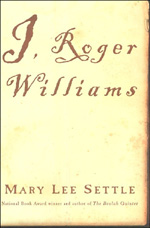 (Reprinted with permission from the Los Angeles Times, written by Anthony Day.)
(Reprinted with permission from the Los Angeles Times, written by Anthony Day.)
Mary Lee Settle’s I, Roger Williams is a beautiful work of art. Daring in conception, elegantly deft in execution, this novel about early life in the American colonies makes vividly present the doughty character of the English Puritan who rose above his time and place to create, with his own work-worn hands, the king post of American liberty.
“In a free state,” Settle quotes from Williams’s words, “no magistrate hath power over the bodies, goods, ends, liberties of a free people, but by their consent.” Those were bold, fighting words in the turmoil of seventeenth-century England, when Protestants fought Catholics, and bloody civil war raged with all sides armed with the certainty that theirs was the Absolute Truth that allowed them to suppress their opponents.
For generations, in the standard American history textbooks, Williams barely achieved more than footnote status, labeled an “intransigent radical” who was driven from the Puritan Massachusetts Bay Colony for his beliefs and founded the colony of Rhode Island on the principle of religious toleration. Radical he was, and intransigent he was, all the time remaining a devout Christian. Modern civil libertarians who regard Williams as a hero will have to acknowledge the depth of his beliefs. Williams advocated strict separation of church and state, declared that persecution for one’s religion was “contrary to the doctrine of Jesus Christ” and opposed the oppression of the Indians, arguing that this land was theirs, to be obtained by purchase, not conquest.
Settle, the author of Blood Tie, which won the National Book Award, faced a daunting task in bringing Williams to life. In recent years there has been a flurry of books about the Founding Fathers. Thanks to these books, the men (and women) of the 1770s and 1780s are almost within our grasp. But it takes much more imagination to leap into the lives of the men and women of 100 or 150 years before. Already, to Nathaniel Hawthorne in the nineteenth century, the Puritans of New England were the grim-visaged shadows of the distant past. How much more have they receded from us, living in the early twenty-first century.
But Settle manages to make that leap over centuries with grace. As she tells us in an afterword, she was greatly aided by Williams’ copious writings, especially of his American letters, which were written hurriedly, to be carried by Indian runners, and so done in a swifter, more natural style than Williams had learned at school at Charterhouse and Pembroke College, Cambridge.
A most natural Williams comes through in Settle’s novel, and a most likable person he is. She presents Williams at the end of his life, in Rhode Island, reminiscing about his early years. This approach allows her to reveal the formation of his opinions—although, considering the force with which he held them, the word “beliefs” or “convictions” seems more apt.
Williams would probably be lost to history were it not that Sir Edward Coke, the lord chief justice of England and the country’s greatest lawyer, became his mentor. In the fire of reform and reaction that burned through England, Scotland, and Ireland, Williams forged the core of convictions that led him to defy the Church of England, the saints of Boston, and the church of Salem and also led to his banishment into the winter wilderness of 1635. He was saved from freezing to death by Indians. He was long after beloved of the Narragansetts, whom he held in high regard and treated with dignity.
Settle evokes the time of her tale with language that beautifully echoes the English of those days. Remembering his banishment, Williams says, in Settle’s re-creation, that the reflection of the moon “lit the snow like some day in night—I could hear animals beyond the trees, and knew that I was watched, but only by the wild and not the civilized that would have destroyed me, oh not by tearing at my throat like the wild animals, but by law and dignity and the awful certainty of righteousness.”
The reader comes away from this novel realizing that Roger Williams deserves to be in the forefront of American historical consciousness. And the portrait that Settle has so artfully and attractively painted in “I, Roger Williams” may just put him there.
Appetizer
That time I remembered to my strength that Sir Edward Coke, the greatest lawyer in England and my own mentor in my youth, was sent himself to the Tower and accused of treason that near cost him his blessed head in the same unjust way. His real crime, so long ago, was that he was too much honored by the people. He saved himself by wit and knowledge, and those fine-honed weapons of anger and memory. Even to his death he taught that to accuse and then seek out a cause is the greatest perversion of the law. He thundered it; he wrote it; he suffered for it. And by his life and work struck the first blow to bring down an absolute monarchy.
—I, Roger Williams